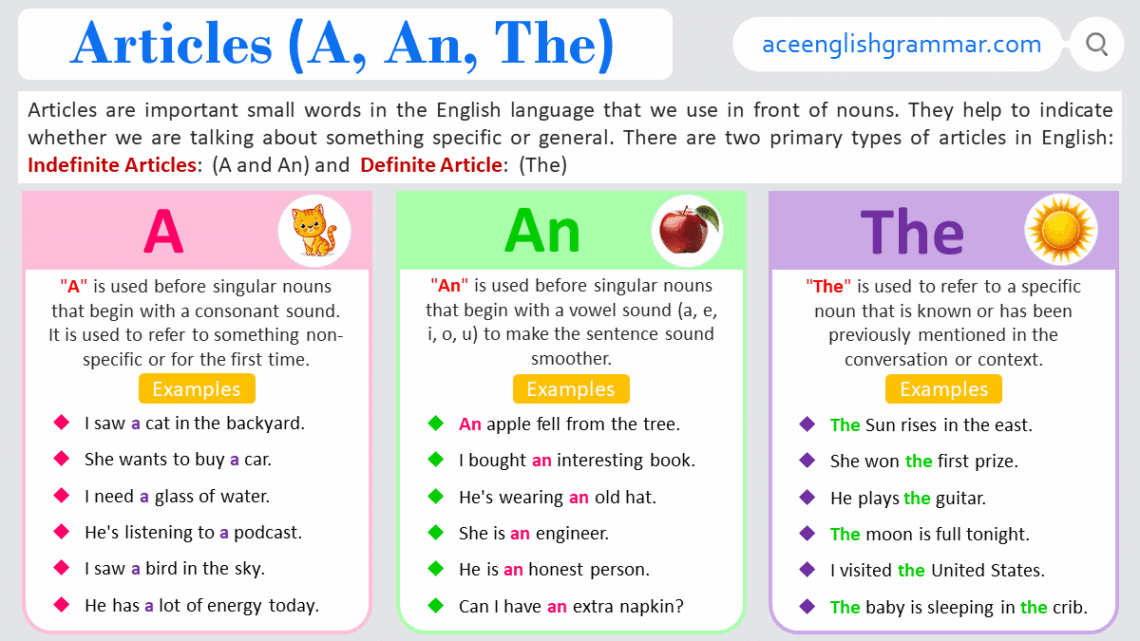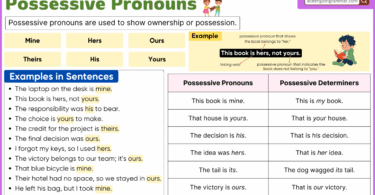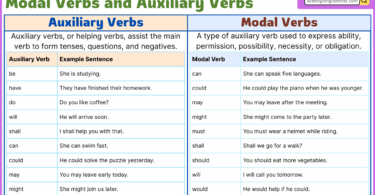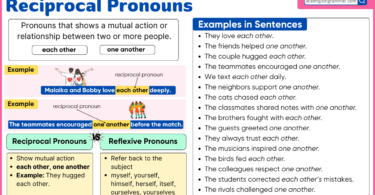An article is a type of determiner used before a noun to indicate whether it refers to something specific or unspecific. In English, there are two main types: the definite article (the) and the indefinite articles (a and an). Articles play a key role in sentence clarity, helping identify which noun is being talked about. This post helps you learn the definition, types, usage rules, and examples of articles in simple, structured steps.
Table of Contents
What is an Article?
Articles—a, an, and the—are placed before nouns to specify whether the noun is being referred to in a general or specific way.
Indefinite Articles: “A” and “An” are indefinite articles used to refer to something non-specific.
- Example: I saw a cat. (refers to any cat, not a particular one)
- Example: She is an engineer. (“an” is used because “engineer” starts with a vowel sound)
Definite Article: “The” is used when talking about something specific or known to both the speaker and listener.
- Example: I saw the dog in the park. (refers to a specific dog, known to both speaker and listener)
Types of Articles
In English, there are two main types of articles:
| Article Type | Examples | Usage |
|---|---|---|
| Indefinite Articles | A, An | Used for non-specific or general nouns |
| Definite Article | The | Used for specific or previously mentioned nouns |
Indefinite Articles: “A” and “An”
“A” and “An” are used with singular nouns to refer to something general or non-specific. The choice between “a” and “an” depends on the sound, not the spelling, of the word that follows.
- A is used before words starting with a consonant sound:
- Example: I saw a car. (Any car, not a specific one)
- An is used before words starting with a vowel sound:
- Example: She ate an apple. (“An” is used because “apple” starts with a vowel sound)
Definite Article: “The”
“The” is used when referring to something specific or something that both the speaker and listener are already familiar with.
- Example: The sun rises in the east. (There is only one sun, making it specific)
- Example: The cat is on the roof. (Refers to a particular cat and roof)
Zero Article
In some situations, no article is used, which is referred to as the “zero article.” This is commonly seen with:
Plural Nouns when used in a general sense:
- Example: Dogs are loyal animals. (refers to all dogs, not specific ones)
Uncountable Nouns in general statements:
- Example: I love music. (no article needed)
Proper Nouns like names of places or people:
- Example: Paris is beautiful. (no article before “Paris”)
Rules for Using Articles
Countable and Uncountable Nouns
Articles are used with countable nouns (e.g., a cat, the book).
Uncountable nouns (e.g., water, music) do not typically take an article unless specified:
- Example: I need water. (general)
- Example: I need the water from the blue bottle. (specific)
Singular vs. Plural
- “A” and “An” are used with singular nouns.
- “The” can be used with both singular and plural nouns:
- Example: The cars are parked. (plural)
Introducing vs. Referring Back
Use “a” or “an” when mentioning something for the first time. Use “the” when referring back to the same item later in the conversation.
- First mention: I bought a car.
- Referring back: The car is red.
Special Rules and Exceptions
Geographical Use
Use “the” with certain geographical features such as oceans, rivers, mountain ranges, and specific countries. For instance:
- The Pacific Ocean
- The Himalayas
- The United States
Superlatives and Ordinal Numbers
Use “the” when referring to superlative adjectives or ordinal numbers to indicate something unique or ranking:
- The tallest building
- The first prize
Adjectives Referring to Groups
“The” is often used with adjectives to refer to a group of people:
- The rich, The poor
Titles of Publications
Use “the” when referring to the names of newspapers and magazines:
- The New York Times, The National Geographic
Specific Uses of “A” and “An”
- Words with Silent “H”: Use “an” when the word starts with a silent “h”:
- Example: An honest person
- Words Starting with a Vowel Sound but Spelled with a Consonant:
- Example: An MBA graduate
- Expressing Nationality or Religion:
- Example: He is a Canadian.
- Abbreviations and Acronyms: Use “a” or “an” depending on the sound of the first letter:
- Example: An FBI agent
- Example: A UFO sighting
Conclusion
Articles in English—a, an, and the—are essential for clear and precise communication. They help distinguish between general and specific references, making sentences more structured and meaningful. Understanding their rules, including when to use indefinite, definite, and zero articles, enhances both writing and speaking skills. By mastering articles, English learners can significantly improve their grammar and fluency.
Read More




